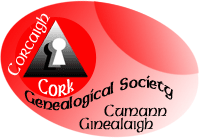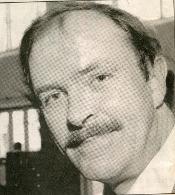

Tim Cadogan RIP Fellow CGS
Tim Cadogan passed away on 1 August 2014 after a long illness. Tim spent most of his working life as an Executive Librarian at Cork County Library, specialising in local history. His mastery of this area of scholarship, I believe, was attained not only by his natural interest in the subject, but also spurred on by his desire to satisfy those who called to the Library to look for assistance. Reminiscing on his career in the County Library service a few years ago, Tim recounted a number of stages in his development as a local historian. In the mid-1970s when he first started handling queries on family history, he said that he found the expectations of the enquirer were low and easily satisfied. The main difficulty at that time was the ever increasing volume of inquiries. In the 1980s he had to cope with a new phenomenon, the overseas visitors who had done their homework. Of this period Tim said: ‘for the first time, the exchange of information became two way and researchers made a greater contribution in the course of the 1980s to my education in genealogy and emigration patterns than I made to theirs.’ The 1980s was also a time when the public library’s reference services came increasingly under greater demands in other information areas such as academic studies and business information. Tim had to widen the scope of his interests and worked hard to get on top of these areas as well. By the advent of the 1990s, after his demanding apprenticeship, Tim emerged as the undisputed master of Cork historical records. His phenomenal knowledge of the county was widely recognised. A 1994 magazine article on the resources of Cork County Library stated: ‘The chief source of genealogical information [at Cork County Library] is Tim Cadogan himself. He has a comprehensive knowledge of the Geography and history of Cork and has a reputation for being able to dig up something new for most of the many researchers who call in to him. ‘ Through the 1990s and into the Third Millennium, Tim’s reputation travelled far and wide. Family history researchers, from Britain, Canada, USA, Australia, New Zealand, indeed from most parts of the world, had a path worn to the County Library to pick his brains on their particular research interest. Tim made the following comment on one such incident: ‘Contacts with the roots phenomenon has been the source of some happy and memorable moments for me. I recall, from many such occasions, an afternoon when I helped an Irish-American Jesuit priest to locate his ancestral family in the tithe books for Bere Island. When success came, he gave an unclerical whoop of joy and danced a jig round the microfilm viewer.’ As well as dealing with those who called in to him, Tim also kept up a huge correspondence in his neat, legible handwriting, with those who mailed queries to him. Though much of his work was done at the Library, Tim normally carried a briefcase back and forth from work to home with him and I suspect that he spent much of his spare time on research queries. From the early 1990s, half the books published about Cork included in the acknowledgements section the sentence: ‘I would also like to thank Tim Cadogan...’ The following sentence from Seán Beecher’s A Dictionary of Cork Slang is typical: ‘I could not have completed the book without the help and co-operation of Tim Cadogan of the Cork County Library. He provided me with books, suggested many sources, and was always patient and courteous.’ With regard to the Cork books in which Tim’s help was not acknowledged, it was often the case that the authors had simply forgotten to thank him: ‘he weighed so lightly what he gave.’ Despite the huge amount of time Tim dedicated to other people’s research, he managed to give talks to historical societies throughout Cork, to produce articles, and to co-found and remain a pillar of the Cork Genealogical Society. Tim also wrote and co-wrote books, notably, A Biographical Dictionary of Cork (with Jeremiah Falvey). Tom Crowley, one of Tim’s old friends from the USA, commented when he heard the news of Tim’s death: ‘My thought this morning: that he passed away without the several books that were in his being, that we will never see.’ I’m sure those who knew Tim would concur. But, perhaps on second thoughts, if Tim had spent more of his time writing books, it would have meant rowing back on the help he dispensed so freely to all those who asked. Essentially, Tim was an inspirational research facilitator and that is what set him apart from all others in the field of local history where an obsession, often selfish, with a narrow topic is the norm. My abiding memory of Tim is chatting to him in the local history room of the old County Library while he sits at his large wooden desk, covered, of course, with an array of books, maps, letters and papers of all kinds. Several people are loitering near the bookshelves or seated at the tables, pretending an interest in various publications but really waiting for an opportunity to talk to Tim. More often than not, I am one of the pretenders myself waiting for my chance. During my many periods of waiting, I’ve had ample opportunity to observe Tim engaged in his work. Whether it was a ten year old primary school pupil doing a project for her teacher, or an academic trying to access some obscure historical data, Tim gave the same politeness, the same respect, the same undivided attention. He gave as much time as each person required (much to the annoyance of those waiting!). Often, before concluding, he would rush off to ransack some library shelves and hand over some books, periodicals or photocopies before concluding and moving on to the next person. Tim’s requiem mass was held in the magnificent St Coleman’s Cathedral in Cobh: how appropriate. From the Great Famine to the mid-twentieth century, Cobh was the main point of departure for the tens of thousands forced by economic reasons to emigrate from Ireland. As they sailed out of Cork Harbour, the spire of St Coleman’s was the last piece of Ireland most of them ever saw. Many of those who came to Tim for help were the descendants of such emigrants, yearning to reconnect to their Irish roots. Tim was the man who helped them make the link. He provided them with their Irish credentials. He will be missed.
Ar dheis Dé go raibh a anam dílis.
Tony McCarthy
3 August 2014